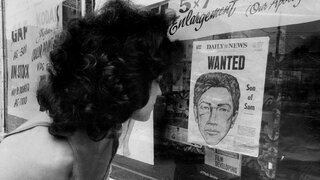Director Of 'Sons Of Sam' Re-Examines The Infamous Case's 'Lone Wolf' Narrative
Director Joshua Zeman chronicles the notorious 1970s murder spree in NYC and the obsessive efforts of journalist Maury Terry to prove it was tied to a nationwide Satanic cult in his new Netflix docuseries, "The Sons of Sam: A Descent Into Darkness."

Before the taping of a 1997 interview that aired on WABC, “Son of Sam” killer David Berkowitz, long portrayed as deranged, seemingly acts as a voice of reason as he tries to talk journalist Maury Terry out of dwelling too much on the infamous case. Terry had become obsessed with the “Son of Sam” murders, dedicating decades of his life to prove that the murders were the work of a nationwide Satanic cabal and this interview was no exception.
“But if it’s too long, you lose people,” Berkowitz told Terry, trying to convince him to shorten the interview. “Because people don’t have the same level of interest that you do.”
Terry, of course, didn't listen, dragging out the interview as long as he could, lingering on details he was infatuated with. He desperately wanted Berkowitz to confirm his theories, so the public could validate his journalistic efforts. Terry had become convinced that Berkowitz wasn’t the triggerman for all six murders and that he was just a small part of a sprawling conspiracy that stretched from coast to coast. Berkowitz even told Terry that others were involved in the 1970s slayings, though he offered little in the way of additional details beyond confirming Terry's at times leading questions.
“The Sons of Sam: A Descent Into Darkness,” a new four-part docuseries on Netflix that debuts May 5, dives into the theories and documents Terry’s single-minded obsession. Oxygen.com talked to the series’ director Joshua Zeman about the case.
Oxygen.com: I think my favorite part is when David Berkowitz looks almost like a voice of reason, trying to convince Maury Terry that people at home will not be as interested in this topic as him.
Zeman: To be honest, that’s one of the things I find so both ironic and interesting about this: that David Berkowitz does become the voice of reason. He’s telling him, ‘Maury, no matter how much evidence you present, the world will never believe you.’ And, I thought that this is so emblematic of Maury Terry’s both obsessions and the fact that David Berkowitz was so prescient to know this.
Oxygen: What does this say about their relationship and also about Maury’s investigation? Furthermore, what does this say about our perception of "Son of Sam," as for years he’s been perceived as really off-the-walls crazy, but in this instance he seems so not insane.
Zeman: Here’s a guy who’s telling Maury Terry, "Nobody is going to be as interested in this as you are so don’t make this too long." I mean, what does it tell you about people’s perceptions when you watch this series that the serial killer is somehow more prescient and together than the journalist interviewing him? I think Maury Terry was battling our perceptions of the "Son of Sam" case. He was battling the press mythologies that had been created and codified for 44 years and I think that very much so this is [....] like that old saying from the film “The Man Who Shot Liberty Valance:” “When the legend becomes fact, print the legend.”
Oxygen: The average person, even in true crime, isn't aware of some of these theories even though they have been circulating for quite some time. The original narrative formed by the police and the media in the immediate aftermath of the killings remains the main theory. Even the 1999 movie “Summer of Sam” depicts David Berkowitz with his hands covering his ears screaming while the neighbor’s dog barks. What does this say about how the police and media form the narrative and how hard it is to change it?
Zeman: Well, that’s one of the biggest points of the whole film, is how these narratives such as Berkowitz being commanded to kill by a demon inside a dog. How they are formed and how the police put those narratives out there, how the press takes them, and if they’re a good narrative like Berkowitz and the demon dog, it’s just so crazy that it becomes a good narrative for them. And then the public has to buy it too.
And remember, that you’re in a time when I think the public was willing to accept it, hook, line, and sinker along with the press. I don’t think that would happen today, but I think it’s a tragedy that it did happen back then and I think it’s a tragedy that Maury Terry couldn't change that narrative. That’s part of this whole story and why I’m thankful that we have this opportunity to retell what I think should be changed in the history books.
Part of it also is Maury Terry’s fault as well. When he was called a crackpot, he kind of double-downed and started to spin further and further down the rabbit hole and he also told his story to the tabloid press because they were the only ones willing to listen. Maury in some ways made a deal with the devil, in terms of telling his story to the tabloid press. So that becomes the tragedy of Maury Terry’s story.
Oxygen: Both with this film and your 2009 film “Cropsey,” you point out what could possibly be perceived as police corruption or laziness in New York. What have you learned through your research and your work about the police and what actually goes on?
Zeman: I think one thing that allows us to look at this case with a different lens is that we now have a lot more transparency when it comes to crime. When I picked up this story I had just finished “The Killing Season,” which is about the sex workers on Long Island, and why that case didn’t get solved. And here we are looking at another case. I don’t think is anything to do with the rank and file; I think much like the case in Long Island, this is about politics and, tragically, the truth suffers when politics gets in the way. Whether it’s “Cropsey,” whether it’s “The Killing Season,” or this, a lot of my series are about getting to the truth and sometimes that truth is shadowed by politics. Sometimes it’s even shadowed by the press and their narratives. My goal is to always be picking that apart and look deeper beyond the headlines.
Oxygen: What parts of this case do you believe could be true and what parts would you like to see incorporated in the main narrative of the "Son of Sam" case?
Zeman: Well, I definitely believe that with the preponderance of evidence, that it’s definitely worth taking a long, hard look at this case. I think it’s time for us to change the official narrative, but my opinion isn't really important. What’s important is what you believe because what’s interesting here is that, again going back to what Berkowitz told Maury: it doesn’t matter how much evidence you have. The world will never believe you until those forces who are in control agree to change that narrative.
Oxygen: With any case, it’s easy to go down rabbit holes. Do you ever feel like you can relate to Maury Terry?
Zeman: To me, all of my work are rabbit holes. I think part of the reason that I did this is almost a tale to myself to be careful. It’s so easy to go down a rabbit hole. Hats off to my producing partners [...] that’s why it’s important not to work in a vacuum. That’s why it’s important to have partners like Netflix and Radical to help pull you out and give you guidance because it’s so easy to get lost.
Oxygen: Do you feel Satanism and cults play a role with serial killings or do you think that’s more Satanic Panic?
Zeman: I simply love to debunk hysterias. It’s so interesting to me the idea of Satanic Panic. It’s something I look at a lot in my work because I think we need to pick apart such hysterias to get to the truth of the matters. I think when it comes down to it, bad people somehow find each other in the darkness. They gravitate towards each other. I think they do so in random ways and less so in very organized ways so I’ve never really been one to believe in the age-old battle of good versus evil, except in our own minds.
Oxygen: What will it take for the narrative of this case to be changed or for people to seriously reconsider the original narrative? And is your goal with this docuseries for it to change?
Zeman: I hope this docuseries helps to rewrite history. I don’t think that will change until the powers that be really decide that they want to get to the bottom of the case in a meaningful way, whether that be the NYPD or folks like that.
Oxygen: I saw that Maury Terry’s book “The Ultimate Evil” was just re-released in tandem with the release of this series.
Zeman: We’ll be having a podcast called “Searching for the Sons of Sam” that is an even deeper dive than what we discussed in the series. With Maury’s investigation which spans over 40 years, [...] we’ve only begun to scratch the surface of the case. So, hopefully, the podcast will provide another layer.
“The Sons of Sam: A Descent Into Darkness,” is available on Netflix Wednesday, May 5.




























